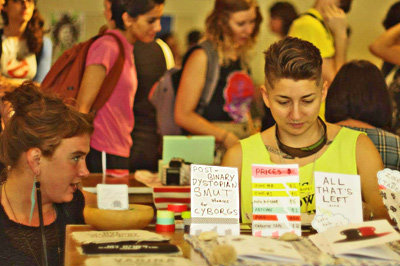The Philly Feminist Zine Fest, which takes place June 28-29, will offer plenty of print for people who prefer reading publications produced outside mainstream media channels.
Organizers expect more than 50 authors and publishers to attend the two-day event, which is free and open to the public. Readings, workshops and skill-shares covering all aspects of zines will be held in a variety of venues throughout the city, including Neighborhood House, 20 N. American St., and Wooden Shoe Books, 704 South St.
Organizers are also planning a series of raffles to raise money for Project SAFE, a local grassroots organization that advocates for the health and safety of sex workers.
The Philly Feminist Zine Fest, also known as PFZF, has its roots in a visit that Sarah Sawyers-Lovett made to the NYC Feminist Zine Fest a few years ago. Sawyers-Lovett, author of the long-running zine “Tazewell’s Favorite Eccentric,” had attended zine fests before, but none like this.
“It was such a different experience than any other zine-related event I had ever been to,” she said. “It was affirming, and it was an entirely different sort of energy to have all of these people who were queer, and female-identified, and gender-queer or just generally politically on the same level.”
Back home, Sawyers-Lovett began talking to fellow zinesters about creating something similar here in Philadelphia. Enthusiasm and support were strong enough that she and a handful of volunteers pulled together the first PFZF in August 2012.
By all accounts, the first PFZF was a resounding success, but Sawyers-Lovett is hoping that this year’s gathering will be even better. Planning for the second PFZF began roughly five months ago, when a six-woman collective began hashing out ideas. This year’s PFZF will be slightly bigger than the first and include more events.
One thing that hasn’t changed, however, is PFZF’s commitment to feminism, understood in a broad and inclusive way.
“We have more support in place and we have a safer-spaces policy,” Sawyers-Lovett said. “In general, we also prioritize the presence of female-identified zinesters, of queer people, of people of color and people with disabilities.”
A quick scan of the schedule reveals that LGBT issues will be well-represented at PFZF. Attendees can find copies of Elvis Bakaitis’ zine “Homos in Herstory,” which focuses on the accomplishments of lesbians, who have sometimes been “erased” from standard histories. They can also purchase issues of Sherley Olopherne’s “Black Lesbians @ Lesbian Herstory Archives.” Olopherne, a self-described Haitian butch, based her zine on materials in the archive related to African-American women. And those are just two examples.
According to Sawyers-Lovett, “We have over 50 zinesters and people who are tabling, and I would say, probably, a third-to-half of those people identify in some way as queer. There are just a ton of zines that explore gender and sexuality in really personal, cool ways that you might not necessarily see in mainstream media.”
PFZF is also notable for its significant inclusion of gender-queer and transgender women. Topside Press, the country’s only publisher of work exclusively written by transgender women, will be tabling, as well as the Transgender Oral History Project.
This variety is actually typical in zine culture, according to Sawyers-Lovett.
“There are as many different types of zines as there are people,” she said.
For those unfamiliar with zines, it might be helpful to know that they are generally small and inexpensive. Most are about the size and length of a pamphlet. They cover a range of topics, too: everything from gender and politics to booking punk shows and baking vegan cupcakes. Some are hand-written; others resemble comic books.
A second important feature of zines is their independence. They are generally written by people who want to express themselves, but who lack access to traditional forms of media like newspapers or magazines. Sawyers-Lovett praised the format for being so egalitarian.
“It is the most democratic form of media because it doesn’t need to go through a gatekeeper like an editor or a publisher in order to be put out in the world,” she said.
PFZF is about more than just zines, though; it’s really about fostering relationships. Sawyers-Lovett, who describes herself as “a nice queer lady from a small town,” notes how important the event is to everyone involved. At the first get-together, plenty of zinesters struck up new friendships or embarked on cool new collaborative projects. But one memory stands out for her.
“There was a girl who kind of randomly asked if she could read from this zine that she wrote about being queer in high school,” she said. “And it was her 16th birthday, and I just thought that was such a sweet, apt summary of everything I wanted to accomplish.”
For more information, visit www.phillyfeministzinefest.com.

